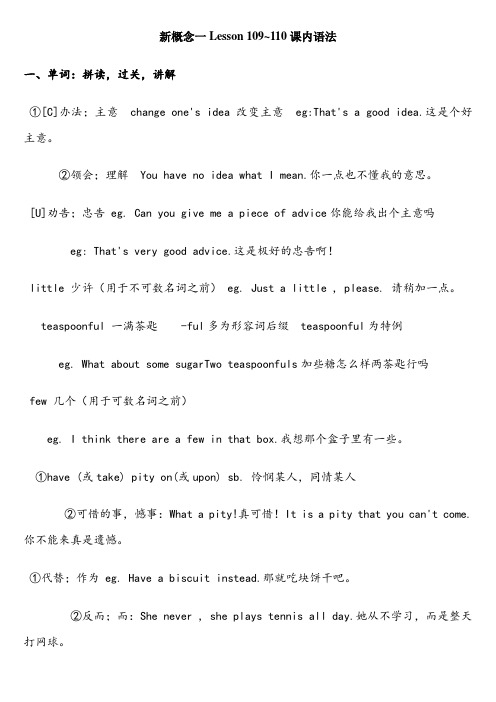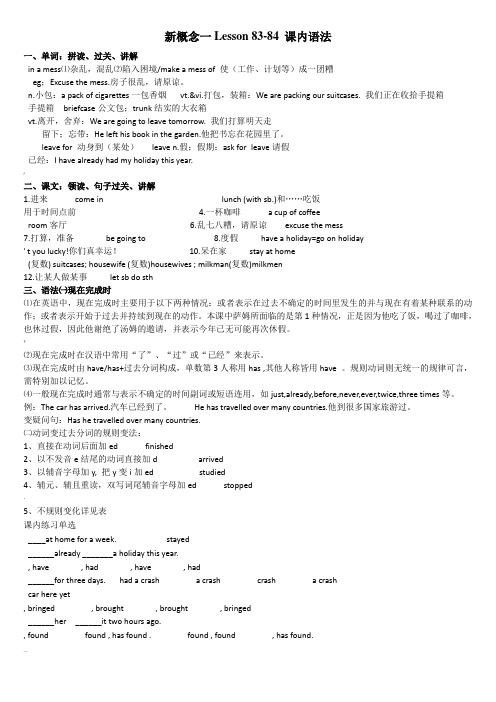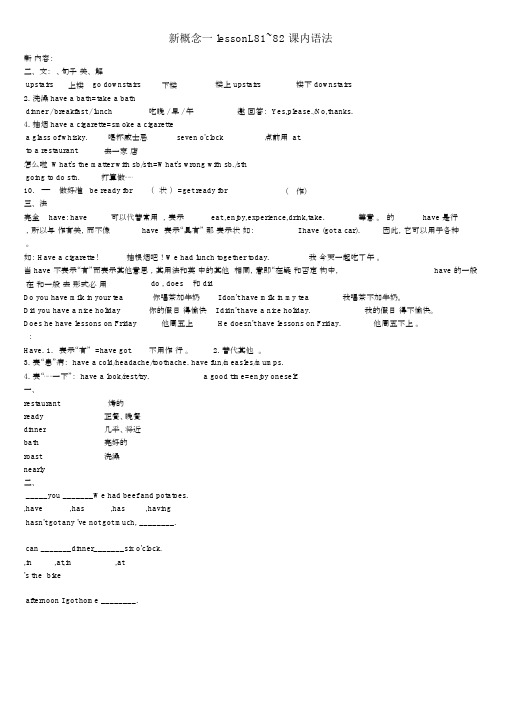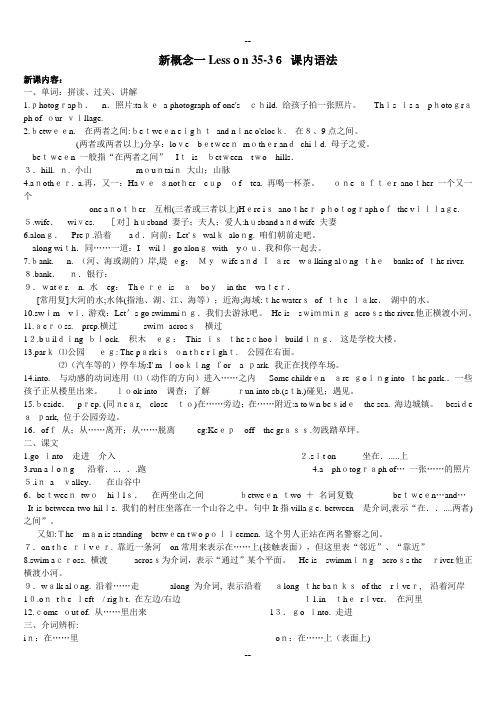新概念第一册Lesson课堂及课后练习
新概念第一册 lesson 69-70 课堂及课后练习

新概念一Lesson69-70课内语法一、单词年-n.年。
in the year 1992在1992年。
last(this,next)year 去(今、明)年the year after next 后年岁:He is twenty years old..他二十岁。
yearly ad.& a. 每年(的);一年一度(的)。
年份的读法:数字表示的年份通常分成两半来说:1074 ten seventy-four 1880 eighteen eighty 1993 nineteen ninety-three注意下面这些年份的读法:1902 ①nineteen O two ②nineteen hundred and two 1600 sixteen hundred2000 two thousand 2005 two thousand and fiven. 赛跑(有一定体态特征的)人种,种族:the black(white)races 黑色(白色)人种…(生物)的种,属,类:the human race 人类n.(1)群,人群。
(2)大众,老百姓。
()一堆;许多(东西):a crowd of 一大堆vi. 站,立(起)vt. [无进行时;用于否定、疑问句][+名或代;+]经受;忍受:I can't stand that new teacher. 我无法忍受那个新老师。
a. exciting news 令人振奋的消息。
正义的;正直的。
[不用于否定句中]正好,恰好,正要:That's just what I wanted. 这正是我所要的。
刚才,刚刚:I'm just out of hospital.我刚刚出院。
just now①[用于过去时]刚才②[用于现在时]眼下,这会儿:I'm busy just now.我现在正忙着。
结束,完毕;完成:Finish one's work 完成工作。
新概念第一册 lesson 109-110 课堂及课后练习

新概念一Lesson 109~110课内语法一、单词:拼读,过关,讲解①[C]办法;主意 change one's idea 改变主意 eg:That's a good idea.这是个好主意。
②领会;理解 You have no idea what I mean.你一点也不懂我的意思。
[U]劝告;忠告 eg. Can you give me a piece of advice你能给我出个主意吗eg: That's very good advice.这是极好的忠告啊!little 少许(用于不可数名词之前) eg. Just a little , please. 请稍加一点。
teaspoonful 一满茶匙 -ful多为形容词后缀 teaspoonful为特例eg. What about some sugarTwo teaspoonfuls加些糖怎么样两茶匙行吗few 几个(用于可数名词之前)eg. I think there are a few in that box.我想那个盒子里有一些。
①have (或take) pity on(或upon) sb. 怜悯某人,同情某人②可惜的事,憾事:What a pity!真可惜!It is a pity that you can't come.你不能来真是遗憾。
①代替;作为 eg. Have a biscuit instead.那就吃块饼干吧。
②反而;而:She never , she plays tennis all day.她从不学习,而是整天打网球。
instead of [相当于介词] 取代;而不……。
“代替”的种种表达instead 单独位于句首或句尾,是副词instead of 用在名词、代词、动名词、不定式、形容词、副词或介词短语前二、课文领读,过关,讲解1、make coffee 沏咖啡2、复习some, any用法 some用于疑问句中,表示邀请或请求,希望得到肯定回答3、be ready for... 为……做准备4、少于……less than5、one and a half+名词复数一个半6、代替 instead of7、我想要 I'd like=I would like 8、真可怜 what a pity9、沏茶 make some tea五、语法。
新概念第一册-lesson-11-12-课堂及课后练习完整

新概念第一册-lesson-11-12-课堂及课后练习(可以直接使用,可编辑优秀版资料,欢迎下载)新概念一Lesson11-12课内语法新课内容:一、单词1.whose (pron 代词)谁的。
例:Whose shirt is that?那是谁的衬衫?/ Whose is this dictionary?这词典是谁的?2.blue (adj.形容词)蓝色的:My shirt is blue.我的衬衫是蓝色的。
(My shirt is=My shirt's)3.perhaps(adv.副词)或者;也许:例:Perhaps it is Tim's.也许是蒂姆的。
4.white (adj.形容词)白色的。
例:Tim's shirt is white.蒂姆的衬衫是白色的。
5.catch (v.动词)(1)抓住。
例:Catch! (2)赶上,赶到:catch the train. 赶上火车。
(3)感染;着(火):catch (a)cold着凉;伤风/catch fire 着火1.father [对]mother父亲father-in-law 岳父;公公This is my father.这是我的父亲。
2.mother n. mother tongue母语,本国语3 blouse (n.名词)女衬衫。
例:Whose is that blouse?那衬衫是谁的?4 sister (n.名词)姐,妹例:It's my sister's.它是我的妹妹的。
5 tie (n.名词)领带6 brother (n.名词)兄,弟二、课文1.Whose(既有形容词词性又有名词词性)引导的特殊疑问句,用来询问某物或某人的所有关系。
Whose +某物is that/this ? 那/这是谁的......?如:Whose book is that?Whose is that /this+某物?那/这个.....是谁的?如:Whose is that book?回答:It is +人名's 如:It is Tim's.或It is + 称谓/人名's 如:It is my mother's. It is Mike's或It is +形物+某物如:It's my book. (It's = It is)或It is + 名物如:It is mine.2.人名's 或称谓's 表示谁的。
新概念第一册 lesson 81-82 课堂及课后练习

5.There are ________ students in their class than in ours.
A.many B.more C.much D.a lot of
新概念一lessonL81~82课内语法
新课内容:
二、课文:领读、句子过关、讲解
e upstairs 上楼 go downstairs 下楼 楼上 upstairs 楼下 downstairs
2.洗澡 have a bath=take a bath
3.have dinner / breakfast / lunch 吃晚/早/午饭 对邀请回答:Yes,please./No,thanks.
A.lived B.has lived C.will live D.is living.
3.Lucy decided to do the work ________.
A.she B.her C.hers D.herself.
4.There______ wrong with with my radio.
4.抽烟 have a cigarette=smoke a cigarette
5.have a glass of whisky.喝杯威士忌 6.at seven o'clock 时间点前用at.
7.go to a restaurant. 去一家饭店
8.---怎么啦? What's the matter with sb/sth=What's wrong wive got.不用作进行时。 2.替代其他动词。
3.表“患”病:have a cold/headache/toothache. have fun/measles/mumps.
新概念第一册 lesson 83-84 课堂及课后练习

新概念一Lesson 83-84 课内语法一、单词:拼读、过关、讲解in a mess⑴杂乱,混乱⑵陷入困境/make a mess of 使(工作、计划等)成一团糟eg;Excuse the mess.房子很乱,请原谅。
n.小包:a pack of cigarettes一包香烟vt.&vi.打包,装箱:We are packing our suitcases. 我们正在收拾手提箱手提箱briefcase公文包;trunk结实的大衣箱vt.离开,舍弃:We are going to leave tomorrow. 我们打算明天走留下;忘带:He left his book in the garden.他把书忘在花园里了。
leave for 动身到(某处)leave n.假;假期:ask for leave请假已经:I have already had my holiday this year.;二、课文:领读、句子过关、讲解1.进来come in lunch (with sb.)和……吃饭用于时间点前 4.一杯咖啡 a cup of coffeeroom客厅 6.乱七八糟,请原谅excuse the mess7.打算,准备be going to 8.度假have a holiday=go on holiday' t you lucky!你们真幸运!10.呆在家stay at home(复数) suitcases; housewife (复数)housewives ; milkman(复数)milkmen12.让某人做某事let sb do sth三、语法㈠现在完成时⑴在英语中,现在完成时主要用于以下两种情况:或者表示在过去不确定的时间里发生的并与现在有着某种联系的动作;或者表示开始于过去并持续到现在的动作。
本课中萨姆所面临的是第1种情况,正是因为他吃了饭,喝过了咖啡,也休过假,因此他谢绝了汤姆的邀请,并表示今年已无可能再次休假。
新概念第一册Lesson课堂及课后练习

四、单词:1、I(人称代词主格)我。
eg: I am a new student.我是一名新学生。
主格:在句子中做主语,用在be动词前、动词前。
宾格:在句子中做宾语,用在动词后、介格后。
eg:I am a student.(I/me) Please give me a book..(I/me)2、am be动词现在时第一人称单数。
are be动词现在时复数。
is be动词现在时第三人称单数。
be 动词:我是am,你是are, I am, you are,is连着他她它,he is 、she is 、it is ,单数is,复数are。
3、name-n,名字v命名。
My name is Robert. 我的名字叫罗伯特。
4、what什么。
含有be动词的特殊疑问句结构:特殊疑问词+be动词+主语?What is your name? 你叫什么名字?what is = what's5、nationality-n国籍。
询问国籍:What nationality+be+主语?What nationality are you?你是哪国人?What nationality is he?他是哪国人?又可用:Where +be+主语+from? Where are you from? Where is he from?6、job-n.工作;职业。
询问职业:What's + one's +job? …的工作是什么?eg:What's your job?你的工作是什么?=What do you do? What's his job?他的工作是什么?7、keyboard-n 电脑键盘。
key-n.钥匙。
board-n.板.8、operator-n操作人员。
keyboard operator 电脑录入员eg:What's your job? I am an operator.operate-v.操作/动手术。
新概念第一册lesson81-82课堂及课后练习.docx

新概念一 lessonL81~82 课内语法新内容:二、文:、句子关、解upstairs上楼go downstairs下楼楼上 upstairs楼下 downstairs2. 洗澡 have a bath=take a bathdinner / breakfast / lunch吃晚 / 早 / 午邀回答: Yes,please./No,thanks.4. 抽烟 have a cigarette=smoke a cigarettea glass of whisky.喝杯威士忌seven o'clock点前用 at.to a restaurant.去一家店怎么啦 What's the matter with sb/sth=What's wrong with sb./sthgoing to do sth.打算做⋯⋯10. ---做好准 be ready for(状) =get ready for(作)三、法完全 have: have可以代替常用,表示eat ,enjoy,experience,drink,take.等意。
的have 是行,所以与作有关,而不像have表示“具有” 那表示状如:I have (got a car).因此,它可以用于各种。
如: Have a cigarette!抽根烟吧!We had lunch together today.我今天一起吃了午。
当 have 不表示“有”而表示其他意思,其用法和英中的其他相同,意即“在疑和否定构中,have 的一般在和一般去形式必用do , does和 didDo you have milk in your tea你唱茶加牛奶I don't have milk in my tea我唱茶不加牛奶。
Did you have a nice holiday你的假日得愉快 I didn't have a nice holiday.我的假日得不愉快。
新概念第一册-Lesson-35-36-课堂及课后练习

新概念一Lesson 35-36课内语法新课内容:一、单词:拼读、过关、讲解1.photograph.n.照片:takea photograph of one'schild. 给孩子拍一张照片。
This is a photograph of our village.2.between. 在两者之间:between eightand nine o'clock.在8、9点之间。
(两者或两者以上)分享:love betweenmother andchild. 母子之爱。
between 一般指“在两者之间”Itisbetween two hills.3.hill. n. 小山mountain大山;山脉4.another. a.再,又一:Haveanother cupof tea. 再喝一杯茶。
one after another 一个又一个one another互相(三者或三者以上)Here isanotherphotograph ofthe village. 5.wife.wives.[对]husband 妻子;夫人;爱人:husband and wife 夫妻6.along.Prep.沿着ad.向前:Let'swalkalong. 咱们朝前走吧。
along with.同……一道:I willgo alongwith you. 我和你一起去。
7.bank. n. (河、海或湖的)岸,堤eg:Mywife and Iare walking along thebanks of the river. 8.bank.n.银行:9.water. n. 水eg:Thereisaboyin the water.[常用复]大河的水;水体(指池、湖、江、海等);近海;海域:the watersof the lake.湖中的水。
10.swim vi. 游戏:Let's go swimming.我们去游泳吧。
- 1、下载文档前请自行甄别文档内容的完整性,平台不提供额外的编辑、内容补充、找答案等附加服务。
- 2、"仅部分预览"的文档,不可在线预览部分如存在完整性等问题,可反馈申请退款(可完整预览的文档不适用该条件!)。
- 3、如文档侵犯您的权益,请联系客服反馈,我们会尽快为您处理(人工客服工作时间:9:00-18:30)。
新概念一L73-74课内语法考核
语法练习:形容词副词
1.一般情况下直接加“ly”,如quick---quickly
2.以“y”结尾的,先将“y”改成“i”,再加“ly”,如happy---happily
3.少数以e结尾的形容词,要去掉e再加-ly。
例如:true-truly等。
但绝大多数以e结尾的形容词仍然直接加-ly。
例如:polite-politely,wide-widely
4.不规则变化
练习一
练习二
1. Look at the children on the playground. They are flying kites ________(happy). Let’s join them.
3.Why do you think you did so ___________(bad)in your test
5.We can __________(easy) forgive a child who is afraid of the dark, but we can’t forgive an adult who is afraid of the light.
6.Congratulations! You’ve answered all the questions _________(correct).
7.The computer is ______(wide)used in our daily life. We can do many things with it.
8. I changed into my sports shoes so that I could walk more ____________(comfortable).
9.Mary passed her examination because she studied very ________(hard).
10.“Why didn’t you tell me earlier” The boss shouted _______(hungry). 12.It’s ___(true) possible that robot t eachers will be popular in schools some day.
13. How _________(comfortable) the giant pandas are living in Taiwan!
14.Miss Xu smiled and said to me ________(soft), “Never mind, my boy!”
st night it rained __________(heavy) in the southern part of the city.
17. Simon hates to be like others, he often tires to do everything ______(different).
19.The children clapped their hands _________(excited) as soon as the astronauts appeared
on the stage.
20.Tom had an accident yesterday. His teacher sent him to the hospital ____(quick).
21. We should speak to the old man _________(polite)
23.I’m _______(true) sorry I can’t go with you. I have a lot to do this afternoon.
新一 L73-74 课前测试
一、单词
1周 2 突然地 3 愉快地 4 讲,说
5 衣袋
6 问候,打招呼
7 匆忙地
8 懂,明白
9 微笑10 公共汽车站
二、词组
1心中暗想2自言自语3把---放在哪里
4迷路5去---的路6对---熟悉
7拿出8告诉某人去哪的路
三、写出下列动词的过去式
___________ ____________ ______________ _______________ ______________ _____________ ______________ _____________
___________
四、选择
_______you last Sunday ---I ______in New York.
, was , were , were , was
often say _______myself"I should study English well."
_______a book and _______it ________Mary.
out , gave---to out , gave---for out , gives---to off , gave---to enjoyed _____yesterday evening.
doesn't know me very _______.
______his book on the desk a moment ago.
waited ______the bus stop two hours ago.
doesn't know the way ______London.
the little boy _______his way.
!He is walking ______in the street.
五、翻译
1、他对伦敦不很熟悉,因此迷了路。
2、你能告诉我到国王街怎么走吗
3、你打算把它漆成什么颜色。
